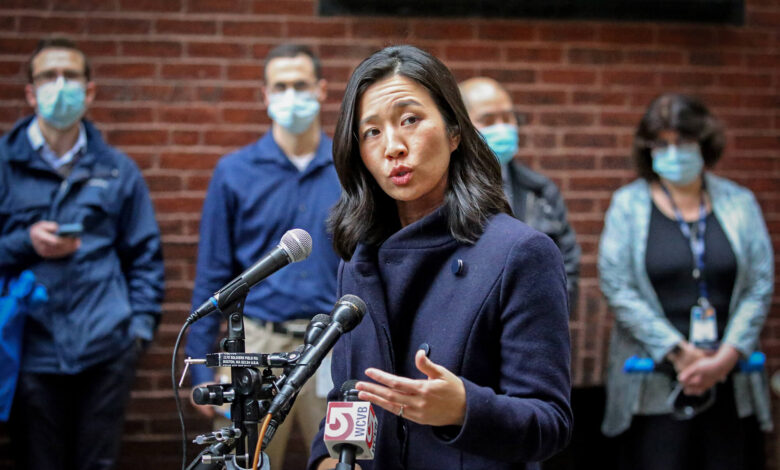Boston Mayor Under Fire After Sending List of Critics and Protests to Jail

Boston Mayor Michelle Wu, a Democrat, is embroiled in a political firestorm after admitting that her administration compiled and distributed a list of her most vocal critics and protesters to local authorities. The revelation has sparked widespread criticism, with many accusing the Mayor of employing “Nixonian tactics” reminiscent of the infamous lists compiled by former President Richard Nixon to target political adversaries. This article aims to provide an in-depth analysis of the controversy surrounding the list, the individuals mentioned, and its potential implications for free speech and political dissent in the city of Boston.
Background: The Need for the List
The controversy began with Mayor Wu’s decision to create the list in response to a series of harassment and physical intimidation incidents targeting her and her family at various public events, including neighborhood parks coffee hours and the Dorchester Day Parade. The relentless nature of these disruptions led the Boston Police Department to request a list of individuals involved in these incidents to devise a safety plan for future events. The Mayor’s spokesperson, Ricardo Patron, stated that the list’s intention was not to suppress free speech or peaceful protest but to address legitimate security concerns arising from the repeated disruptions.
The Email Revelation and Nixonian Comparisons
The existence of the list came to light when an email containing its contents was disclosed through a public records request made by Wu’s opponents. This revelation immediately drew parallels to the Nixon administration’s practice of compiling “enemies lists” to target political adversaries during the Watergate scandal. Critics argue that creating such a list, even for security purposes, raises serious questions about the potential abuse of power and the chilling effect it may have on free speech and political dissent within the city.
Individuals on the List
The list reportedly includes names of several individuals known for their vocal opposition to Mayor Wu’s policies. Among them are:
1. Patrick Mendoza: A North End restaurant owner wanted on charges related to a recent gunshot incident stemming from an ongoing conflict with a local resident. Mendoza’s brother, Jorge Mendoza, who co-owns the restaurant, had previously sued Mayor Wu over the North End outdoor eating tax and is also listed.
2. Catherine Vitale: A resident of Dorchester and a candidate for Boston City Council, Catherine Vitale was detained last year for allegedly punching a police officer while attempting to disrupt a press conference at City Hall. Vitale maintains that she and other demonstrators are being unjustly portrayed as aggressors.
3. Shawn Nelson: A Dorchester native and Boston City Council candidate, Shawn Nelson, faced two arrests for disrupting municipal activities—once during a Mayor’s coffee hour and another during a City Council meeting.
4. Shana Cottone: A former Boston police sergeant, Shana Cottone, was dismissed from her position in March for allegedly allowing her political beliefs to interfere with her professional responsibilities. An internal investigation revealed that she failed to assign Mayor Wu a security detail and reportedly followed her in a car, among other incidents.
Potential Implications for Free Speech and Political Dissent
The controversy surrounding the list raises concerns about the potential impact on free speech and political dissent in Boston. While Mayor Wu’s administration maintains that the list was created solely for security reasons, critics argue that it could discourage individuals from expressing their opinions openly for fear of being targeted by the government. This chilling effect may undermine the democratic principles of free speech and civic engagement that are essential for a healthy political discourse.
Critics assert that creating such a list goes beyond legitimate security measures and may be perceived as an abuse of power, especially given its association with Nixonian practices of political retribution. The comparison to Nixon’s enemies list, known for its secrecy and targeting of political opponents, further exacerbates public mistrust in the government’s intentions and commitment to safeguarding civil liberties.
Public Backlash and Calls for Accountability
As news of the list spreads, public outrage and demands for accountability have grown. Advocacy groups, civil rights organizations, and some elected officials have called for an independent investigation into the list’s creation and distribution. They argue that a thorough and transparent review is necessary to ascertain whether any constitutional rights have been violated and to restore public trust in the city’s administration.
Mayor Wu’s Response
Facing intense scrutiny, Mayor Wu addressed the controversy in a public statement, acknowledging that the decision to create the list has caused division and concern among constituents. She emphasized that her administration’s primary objective was to ensure public safety, but she also acknowledged the valid concerns raised about free speech and political dissent. In response to calls for an investigation, the Mayor expressed her willingness to cooperate fully with any independent review to shed light on the matter.
Conclusion
The revelation of Mayor Michelle Wu’s administration compiling a list of critics and protesters and distributing it to local authorities has ignited a fierce debate about free speech, political dissent, and the appropriate use of government power. While the Mayor contends that the list’s purpose was to address security concerns, critics argue that its creation raises alarming questions about potential abuses of power and attempts to suppress political opposition. As Boston grapples with this controversy, it is vital for civic leaders and citizens alike to engage in a thoughtful discussion about the delicate balance between security measures and safeguarding democratic values. Only through open dialogue, transparency, and adherence to democratic principles can the city hope to heal and move forward.



